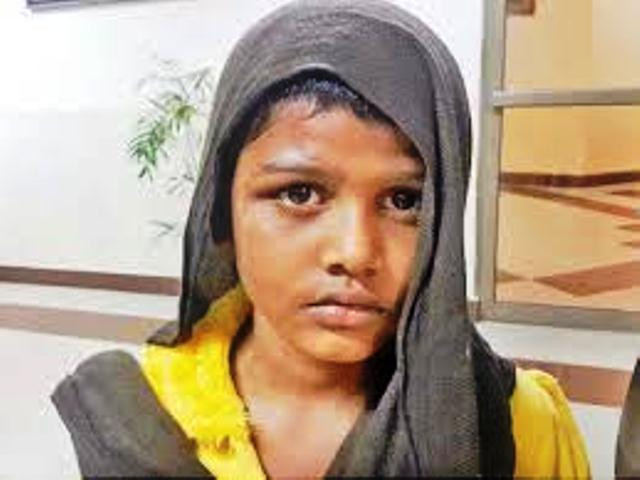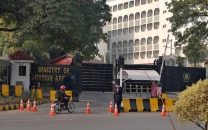Child maids: Tayyaba case casts light on public secret
Tayyaba's father admits his lawyer was paid for by the suspects in question and had convinced Azam to drop the case

Pictures of a 10-year-old Tayyaba shocked Pakistan when they first circulated on Twitter in late 2016.
Her bruised face sparked mass outrage, with tweeters condemning the treatment of maids. The young girl had been working as a child maid for a local judge and his wife.
Shameful. Father of a 10-year-old housemaid ‘forgave’ the sessions court judge for torturing his daughter #Tayyaba. https://t.co/hMfcuMrTFN pic.twitter.com/IjzTrT1flA
— Naila Inayat (@nailainayat) January 3, 2017
She now lives in a home run by SOS Children's Village and attends school. She is adjusting to a new life, but still finds it difficult to talk about her past.
Azmat, a carer at SOS, remarks that initially, Tayabba couldn't believe she had to work to earn her keep.
"She used to think of me in the same way, that I would make her work, that I would beat her. After a month or two she was finally convinced that she doesn't have to do any sweeping, doesn't have to wash any dishes, and isn't going to be beaten," he says.
Her former employers, the judge and his wife, have denied mistreating Tayyaba. Tayabba's testimony however, tells a different story. She spoke to the BBC about being beaten by the wife simply for losing a broom.
IHC issues contempt notice to lawyer in child-maid torture case
"They also burnt my hands," she added.
A year on, the scars still mark her hands.
"My family had to pay off a debt... that's what my mum told me," she told the BBC when questioned if her parents had explained to her why she worked instead of going to school.
Tayyaba grew up in a village outside of Faisalabad. Her father was a labourer named Azam. He sent her off to work after his finger was cut off in an accident.
"I couldn't work and my wife needed an operation. We needed money, so I asked a friend and he suggested this family."
Azam claims he was under the impression Tayyaba would just be required "to play" with the couple's young children. Although child labour is banned in most formal businesses, it is still prevalent in domestic work. Child maids, required to cook, clean and rear children, number in the thousands.
Recruiting child maids is also a lucrative business. Irshad Bibi, who runs an employment agency near Islamabad.
"I find work for children who are at least 12 years old, not younger than 10," she says defensively.
A long queue of families lines her office; they are all trying to find jobs for their children. One father searches for a new job for his children though they ran from their last job. He says he needs the money.
"No parent wants their young child to go and work," Irshad explains, "They're desperate... Here now is a parent crying, saying 'I am being thrown out of my house, I haven't even got 5,000 rupees, take my child and get her some work'."
Irshad assured that none of her child recruits have been abused but that the phenomenon is common, and cases hardly ever see justice.
Since most criminal cases are filed by victims or their families instead of the state, the abuse charges can be dropped using the forgiveness law. Lawyers say that families are often paid off to drop the charges.
When Tayyaba's case went to court, Maheen Zafar was accused of assault and her husband, Judge Raja Khurram Ali was accused of cruelty to a minor child.
Azam and his lawyer have attempted to have the case dropped but have been overruled by the Supreme Court, which ordered a trial.
Tayyaba had testified that a beating had taken place and repeated the claim in court. Azam, her father, however, was insistent that no crime had taken place.
"What she said to us was, 'I fell down the staircase,' not that she was beaten."
Under cross-examination, she contradicted herself and withdrew her claim. The court observed her mono-syllabic, short answers to the defence lawyers. Tayyaba's carer, who accompanied her to court, claimed her hands grew cold with fear when she spotted the defendants.
Azam has accused the police of frightening his daughter into making an accusation. He is insistent, believing the couple is innocent. "They have young children themselves, and when you have young children yourself you can't mistreat other young children."
He has denied any offers of money to drop the case. "They have not put any pressure on us. They have never offered us any money nor made any threats."
Tayyaba torture case: Judge, wife get one year in jail
The Cycle Continues
Tayyaba's case gained a lot of media attention since it first came to light on Twitter. Qudsia Mehmood, a child rights activist, told the BBC that publicity and media attention have helped to close a legal loophole that allowed children to be employed as domestic servants in Islamabad.
This law applies only to the capital, however, and Mehmood wants a country-wide legislation to be passed. She acknowledges that even in the event of legislation, it will be a difficult law to implement.
With poor families willing to send their children to work and rich families willing to employ them, the cycle will continue.
Irshad Bibi and her recruitment agent, Sidra, received contiuous phone calls with clients looking for maids, as they spoke to the BBC.
When probed if she ever had to assure poor parents of the child maid's safety, Sidra says, "Yes, I have. We say, 'Send your children, and we'll look after them.'"
They visit the home of a 10-year-old potential recruit, Rabia. The family is hoping to find her work in Islamabad. Although she has never worked before, she informs the BBC that she washes dishes and helps to take care of the goats.
"We're poor. We have no choice," says her mother who worked as a maid herself as a child for the village landlord. "The first few days you think, 'Where am I?' Then you just put up with it."
Coming Clean
Near the end of Tayyaba's trial, BBC News receives a call from Azam who wishes to tell the truth and invites BBC's reporter, Secunder Kirmani back to his village.
He says that Tayyaba did tell him about her beating. "She said that the judge's wife had burnt her with an iron, and didn't give her a bed at night."
He admits that his lawyer was arranged and paid for by the suspects in question and he had convinced Azam to drop the case. "He said: 'This isn't a bribe, it's a token of sympathy. Your kids don't have a home, we'll get you a house and a car. We'll help you.'
He says, "If I didn't speak out against them then I'd get whatever I wanted."
He said he wanted to come clean, and gain custody of his daughter. He also admitted that the promises of financial aid to the family were never realised. "I thought OK, whatever has happened has happened, at least the rest of my kids will have a better life. But they haven't given me anything."
His account was corroborated by a second source involved in the negotiations. The lawyer has denied the validity of the claims, pointing to Azam's court testimony claiming he wasn't under pressure.
Raja Khurram Ali and Maheen Zafar's lawyer has claimed these allegations are false and malicious.
The couple have been sentenced to a year in jail after being convicted of neglect of an injured child. They were acquitted of other charges, however, including the charge of assaulting Tayyaba.
They still remain free as they wait to appeal the verdict.
Tayyaba, however, can see the silver lining. She wants to be a teacher when she grows up, claiming children should be in school--not working.
This story originally appeared on BBC News.



















COMMENTS
Comments are moderated and generally will be posted if they are on-topic and not abusive.
For more information, please see our Comments FAQ